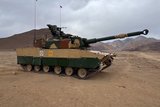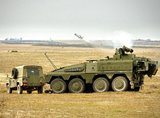Dutch DMO extends Rheinmetall ammo partnership
Rheinmetall will continue to supply ammunition to the Dutch procurement authority, the Defence Materiel Organisation (DMO), under a renewed partnership agreement announced on 18 June.
The new agreement will run until the end of 2030. It will ensure that the Dutch military has a steady supply of safe, secure ammunition, including for weapons supplied by the company such as the CV9035 infantry fighting vehicle and the PzH2000 self-propelled howitzer.
Working closely with the DMO, Rheinmetall will optimise ammunition production planning, boosting economic efficiency. In turn, Rheinmetall will keep DMO actively informed concerning forthcoming production possibilities, resulting in cost savings and also facilitating the Dutch budget planning process.
The partnership also promotes ammunition enhancement as well as performance-oriented logistics, such as recycling or modification of existing ammunition, components and ammunition packaging.
As part of the partnership agreement, an extension of the existing framework contracts for the supply of 155mm ammunition, 35mm medium-calibre ammunition and 40mm ROSY cartridges to DMO will also be sought.
Related Equipment in Defence Insight
More from Land Warfare
-
![Layered protection: How air defence is adapting to rising drone and missile threats (podcast)]()
Layered protection: How air defence is adapting to rising drone and missile threats (podcast)
A surge in aerial threats – from advanced missiles to low-cost drones – is reshaping the way militaries approach air defence, driving demand for flexible, multi-layered solutions.
-
![Indian Army’s new battle blueprint takes shape]()
Indian Army’s new battle blueprint takes shape
The Indian Army’s modernisation plans reflect the lessons learned from ongoing conflicts and threats as it continues its push for indigenous capabilities.
-
![Portugal set to join Boxer team as it progresses its army transformation]()
Portugal set to join Boxer team as it progresses its army transformation
The Portuguese Army is undergoing an overhaul of its platforms with the latest move towards Boxer 8x8 vehicles marking a major step in reforming and modernising its brigades.























